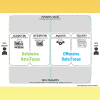Business Transformation Requires Transformational Leaders
Leadership and teaming skills are front and center in times of rapid change. Meet today’s constant disruption head on with expert guidance in leadership, business strategy, transformation, and innovation. Whether the disruption du jour is a digitally-driven upending of traditional business models, the pandemic-driven end to business as usual, or the change-driven challenge of staffing that meets your transformation plans — you’ll be prepared with cutting edge techniques and expert knowledge that enable strategic leadership.
Subscribe to Arthur D. Little's Culture & Leadership Newsletter
Insight
Watching Things Go Digital
I don’t know how to best identify the point in time when computers merged with communications and became customer utilities and entertainment devices, but clearly that transition was a major step toward creating the digital environment we all live in today.
Agile — More Valuable than Ever
The task organizational leaders face right now is how to turn their companies into resilient organizations. Though this is a question far beyond the scope of an Advisor, there are three basic capabilities resilient systems need to show: speed, flexibility, and diversity.
We need to understand that a customer’s interactions with our company are just a small part of a bigger picture. The sum of the interactions a customer has with our company isn’t the customer experience, that is just part of the whole customer experience.
Whether we choose to face it or not, digital disruption is here to stay. Whether we choose to accept it or not, digital disruption will affect every enterprise. The jury on our digitized future is still out, and it may be some time before it comes to a unanimous conclusion. In the meantime, there are plenty of serious writers and researchers who predict some significant changes in our world. In this Advisor, I sketch some of these ideas so that you can consider them in your future planning scenarios.
The Data Value Map: Data’s Discursive Template
In this Executive Update, we present the Data Value Map (DVM), a discursive template that facilitates the development of a shared understanding around data. The template helps enable open conversations and a co-construction of understanding between the parties involved, which can promote a value-driven approach to data projects.
If electric cars and trucks are the vehicles of the future, then that already suggests a massive change in the industrial infrastructure — new modes of manufacturing, new modes of refueling and repair, and, perhaps, new roads. Given the key role of autos in society, such a transition will be a major story. However, it is really only a small part of the changes facing the automobile industry.
The real “lean” in the Lean world (or the “agile” in the Agile world) will manifest only when an organization’s focus is on the development of the whole organizational system.
Agile organizations need a description of how teams work from beginning to end. The Agile product development framework will illustrate how operational and delivery risks are evaluated and reduced in an innovative environment.












